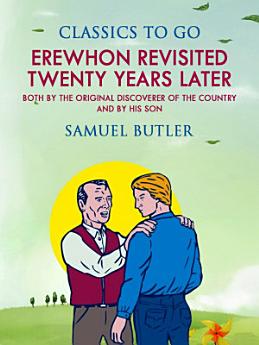Erewhon Revisited Twenty Years Later, Both by the Original Discoverer of the Country and by His Son
May 2019 · Otbebookpublishing
Ebook
219
Pages
family_home
Eligible
info
reportRatings and reviews aren’t verified Learn More
About this ebook
Erewhon Revisited Twenty Years Later, Both by the Original Discoverer of the Country and by His Son (1901) is a satirical novel by Samuel Butler, forming a belated sequel to his Erewhon (1872). The Cambridge History of English and American Literature judges that it "has less of the free imaginative play of its predecessor...but, in sharp brilliance of wit and criticism, in intellectual unity and coherence, it surpasses Erewhon" (Wikipedia)
About the author
Samuel Butler (1835-1902) was an English novelist, essayist, and critic whose work often challenged the Victorian norms of his time. Born into a family with strong clerical ties, Butler initially pursued a career in the Church but soon found himself at odds with its doctrines. His decision to abandon this path and move to New Zealand marked the beginning of a life characterized by intellectual rebellion and exploration.Butler's literary contributions are marked by his incisive critiques of contemporary society, religion, and science. His satirical and often controversial viewpoints resonated with a growing audience disillusioned by the rigid structures of Victorian England. He was an early critic of Charles Darwin's theory of natural selection, proposing instead that evolution was driven by a form of will or desire, a concept that prefigured later ideas in evolutionary biology.One of Butler's most revolutionary ideas was his exploration of the relationship between humans and machines, anticipating themes that would later become central to science fiction. His works delved into the ethical and existential implications of technological advancement, making him a precursor to modern thinkers in the field.Butler's influence extended to contemporary writers such as George Bernard Shaw and Aldous Huxley, who admired his unorthodox thinking and willingness to question established norms. Despite facing significant criticism during his lifetime, Butler's legacy endures as a pioneering voice that challenged the status quo and paved the way for future literary and philosophical inquiry.
Rate this ebook
Tell us what you think.
Reading information
Smartphones and tablets
Install the Google Play Books app for Android and iPad/iPhone. It syncs automatically with your account and allows you to read online or offline wherever you are.
Laptops and computers
You can listen to audiobooks purchased on Google Play using your computer's web browser.
eReaders and other devices
To read on e-ink devices like Kobo eReaders, you'll need to download a file and transfer it to your device. Follow the detailed Help Center instructions to transfer the files to supported eReaders.








